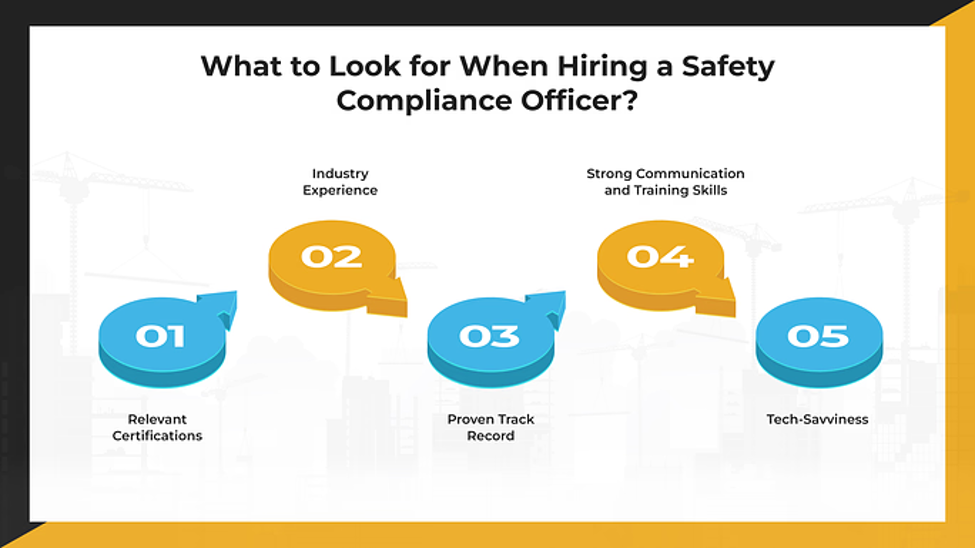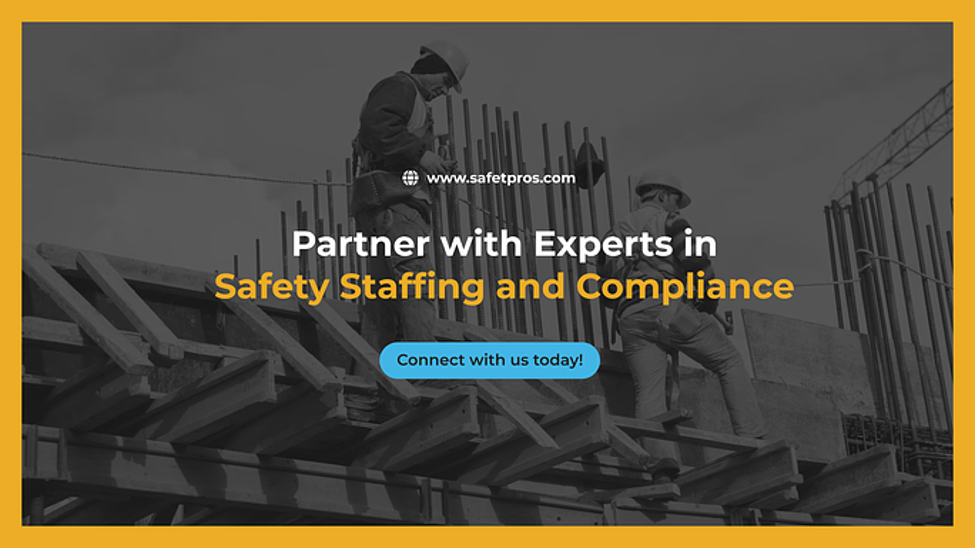Workplace safety is a critical part of business operations. It protects employees, ensures compliance with regulations, and helps avoid costly disruptions. Yet, many organizations struggle to keep up with changing safety laws, internal enforcement, and incident prevention.
The risks of getting it wrong are severe. A single safety violation can lead to fines, legal action, project delays, or even injury or loss of life. These consequences can escalate quickly in high-risk industries like construction, manufacturing, or oil and gas.
Managing these risks requires more than just policies on paper. It demands consistent oversight, ongoing training, and accurate reporting—tasks that often fall through the cracks when assigned to someone without the right expertise.
This is where a safety compliance officer comes in. These professionals are trained to identify hazards, enforce safety standards, conduct audits, and ensure full compliance with OSHA and other regulatory bodies.
In this blog, we’ll look at what safety compliance officers do, why their role is essential across industries, and how hiring the right safety expert can protect your people and your business.
What Does a Safety Compliance Officer Do?
A safety compliance officer (SCO) ensures that a workplace operates within health and safety regulations. Their specific and technical responsibilities directly impact legal compliance, employee safety, and risk management.
1. Ensures Workplace Health and Safety Standards
The safety compliance officer reviews the workplace environment, equipment, and operations to ensure they meet required safety standards. This includes verifying compliance with OSHA regulations, industry-specific rules, and internal company policies.
2. Conducts Audits and Risk Assessments
They perform regular audits and physical inspections to identify safety hazards or violations. They also conduct risk assessments to evaluate the likelihood and impact of potential incidents, helping the company take preventive action.
3. Develops and Implements Safety Protocols
The officer writes safety procedures and emergency response plans tailored to the company’s operations. They also create and lead training sessions to educate employees on safe work practices, equipment handling, and incident reporting.
4. Maintains Compliance Documentation
All safety activities, incidents, inspections, and corrective actions are documented. The SCO ensures these records are complete, current, and ready for review by regulatory bodies during audits or investigations.
5. Keeps Up-to-Date with Local, State, and Federal Regulations
Safety regulations change. The officer tracks updates from agencies like OSHA, EPA, or local authorities and adjusts internal policies and practices to stay compliant.
Why Hire a Safety Compliance Officer Instead of Assigning In-House?
Hiring a dedicated safety compliance officer provides distinct advantages over assigning safety duties to an existing employee who may lack the required expertise or time.
1. Specialized Expertise
A professional safety compliance officer is trained in health and safety regulations such as OSHA, NFPA, EPA, and industry-specific codes. They understand how to interpret and apply these rules in different work environments. This reduces errors and ensures that safety measures are legally sound and up-to-date.
2. Reduces Liability and Legal Exposure
Non-compliance can lead to fines, lawsuits, or even shutdowns. A qualified officer identifies and corrects compliance issues before they become legal problems. This lowers the company’s risk of penalties and helps maintain a clean safety record.
3. Frees Up Internal Resources
When added to an existing employee’s workload, safety responsibilities can dilute their core duties and the attention paid to safety. Hiring a dedicated officer allows internal teams to focus on their primary roles while handling safety professionally.
4. Brings a Third-Party Perspective
An external or newly hired safety officer brings a fresh set of eyes. They can spot risks and gaps internal staff might overlook due to familiarity or bias. This leads to more accurate assessments and better-informed safety decisions.
Industries That Benefit Most From Hiring Safety Compliance Officers
Some industries face higher safety risks and stricter regulations. In these sectors, hiring a Safety Compliance Officer (SCO) is not just helpful—it’s often essential.
1. Construction
Construction sites involve work at heights, heavy machinery, electrical systems, and hazardous materials. OSHA regulations require regular inspections, safety training, fall protection plans, and equipment checks. An SCO helps manage these requirements and reduce the risk of serious injuries.
2. Manufacturing
Manufacturing plants often use moving equipment, pressurized systems, and chemicals. Safety concerns include noise, repetitive motion, and lockout/tagout procedures. An SCO ensures that machine guarding, ventilation, and training protocols are followed.
3. Oil & Gas
This industry faces high risks related to flammable substances, confined spaces, and remote worksites. Safety standards from OSHA, NFPA, and API must be strictly followed. SCOs help implement emergency response plans and monitor high-risk activities like drilling or pipeline maintenance.
4. Warehousing and Logistics
Common risks include forklift operation, falling items, and ergonomic strain. Safety regulations cover vehicle movement, loading procedures, and fire exits. An SCO ensures safe traffic flows, proper signage, and staff training on lifting techniques and PPE.
5. Healthcare
Hospitals and clinics face risks such as exposure to infectious diseases, needle-stick injuries, and chemical hazards from cleaning agents. Compliance with OSHA’s Bloodborne Pathogens Standard and infection control policies is critical. An SCO helps facilities maintain safety for both staff and patients.
6. Food Production
This sector must comply with both workplace safety and food safety standards. Risks include equipment injuries, chemical exposure, and contamination. SCOs coordinate cross-compliance with OSHA and FDA rules, ensuring clean, safe working environments and proper hygiene protocols.
In-House vs. Outsourced Safety Officers: What’s the Right Fit for Your Business?
Choosing between an in-house Safety Compliance Officer (SCO) and an outsourced one depends on the organization’s size, needs, and structure. Both models offer clear advantages and limitations.
1. In-House Safety Compliance Officers
Pros
✔Better Integration: An in-house officer is embedded in daily operations and understands the company’s processes, people, and culture.
✔Immediate Availability: They are always on-site or readily accessible, helpful in handling urgent issues or real-time decision-making.
Cons
✘ Higher Cost: Hiring a full-time specialist involves salary, benefits, and ongoing training expenses.
✘ Limited Perspective: Over time, internal staff may become less objective. Familiarity with routine operations can lead to overlooked risks or outdated practices.
Outsourced Safety Compliance Officers
Pros
✔Cost-Effective: Companies pay only for the time and services they need, which is often more affordable than a full-time hire.
✔Broad Expertise: Outsourced professionals often work across multiple industries and bring a wider range of experience and up-to-date regulatory knowledge.
Cons
✘Less Familiarity with Operations: Outsourced officers may need time to understand company-specific processes, so their recommendations might be less tailored initially.
A hybrid model may offer the best balance for small to mid-sized companies or those with changing safety needs. This model can involve using an outsourced SCO for audits, training, or policy development while maintaining basic safety oversight in-house.
What to Look for When Hiring a Safety Compliance Officer?
When selecting a safety compliance officer (SCO), it’s essential to choose someone who has the right mix of credentials, industry experience, and communication skills. This ensures they meet regulatory requirements and helps create a safer work environment.
1. Relevant Certifications
Look for professionals with certifications that match your regulatory needs. Common credentials include:
- CSP (Certified Safety Professional)
- CHST (Construction Health and Safety Technician)
- OSHA 30-Hour Certification
- NEBOSH Certification
These indicate formal training and a verified level of knowledge in safety regulations and risk management.
2. Industry Experience
Every industry has its safety challenges. A candidate with experience in your field will better understand the specific hazards, compliance requirements, and best practices relevant to your operations. This shortens the learning curve and reduces risk.
3. Proven Track Record
Ask for documented results or case studies. An effective SCO should be able to show how they’ve helped reduce incident rates, improved safety audit outcomes, or implemented successful training programs.
4. Strong Communication and Training Skills
Safety isn’t just about procedures; it’s about people. A good officer must clearly explain policies, train teams effectively, and communicate risks so that all employees can understand and act on.
5. Tech-Savviness
Modern safety management relies on digital tools. Look for someone familiar with EHS (environmental, health & safety) software, data tracking systems, and digital reporting platforms. This helps streamline compliance and improve documentation accuracy.
Understanding the Costs of Hiring a Safety Compliance Officer
The cost of hiring a Safety Compliance Officer (SCO) depends on the type of employment, the complexity of the work, and several market factors. While the expense can vary, it’s essential to understand how pricing works and what value a qualified SCO brings to an organization.
1. Pay Structure: Hourly, Contract-Based, or Full-Time
| Hiring Model | Common Use Case | Typical Cost Range |
| Hourly | Short-term projects, inspections | $40 – $100/hour |
| Contract-Based | Ongoing support, part-time roles, and outsourced consultants | $2,000 – $10,000+/month |
| Full-Time Employment | In-house compliance management, large or high-risk operations | $65,000 – $110,000/year |
Several variables can affect how much you pay for a safety compliance officer:
- Location: Costs are higher in major metropolitan areas due to demand and cost of living.
- Industry Risk Level: High-risk sectors like oil & gas, construction, or chemical manufacturing often require more experienced officers, raising costs.
- Certification Level: Officers with advanced certifications (e.g., CSP, NEBOSH, MSHA) command higher rates because of their specialized training and qualifications.
- Scope of Work: The higher the cost, the more responsibilities are involved, such as managing multiple sites, leading training sessions, or preparing for third-party audits.
Though hiring an SCO is a cost, it often leads to measurable financial benefits:
OSHA violations can result in fines ranging from hundreds to tens of thousands per incident. A competent SCO helps prevent these penalties by ensuring compliance. Insurers often reduce premiums for companies with strong safety programs.
Having a certified SCO on staff may qualify your business for these savings. Reducing workplace accidents means lower compensation claims, less downtime, and better productivity.
Partner with Experts in Safety Staffing and Compliance
At Safe T Professionals, we are dedicated to elevating safety standards through our expert consulting services. By proactively addressing and preventing safety issues and equipping your workforce with the necessary knowledge and tools, we help create a safer work environment.
Partner with Safe T Professionals to enhance your company’s safety protocols and ensure compliance with industry standards. Whether you’re looking to fill safety-specific roles or need expert consultation to mitigate workplace hazards, we’re here to help.
Connect with us today!





